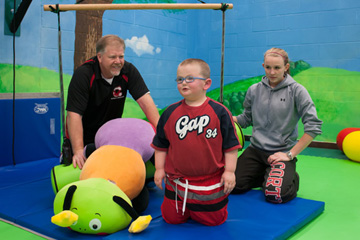
10/29/2015
An increasing number of children diagnosed with autism spectrum disorder means a greater need to understand a child’s learning ability on a sensory level. It’s why SUNY Cortland Associate Professor of Physical Education Timothy Davis on Thursday, Nov. 5, will discuss the developmental disability that affects roughly one in 68 children in the U.S.
Davis, who has taught adapted physical education for over 25 years, will lead a Community Roundtable discussion on “Sensory Processing, Disorders and Autism” from 8 to 9 a.m. in the Park Center C-Club Hall of Fame Room. During the talk, he will explain evidence-based practices that may improve behavior as well as the many uses of the Sensory Integration Motor Sensory (SIMS) Laboratory housed in Park Center on the College’s campus.
Sponsored by the SUNY Cortland President’s Office, the roundtable is free and open to the public. Refreshments will precede the lecture at 7:45 a.m. Participants also will be able to view the SIMS Lab and the equipment it has to offer.
“There’s a tremendous need in communities and in schools for kids who need help processing sensory stimuli,” Davis said. “There’s been a significant increase in children diagnosed with autism as well as children who have sensory processing disorder, so it’s important for not only the kids but also educating teachers who will see this every day.”
Sensory processing disorder is a condition that exists when sight, sound, touch and smell signals do not respond appropriately — essentially a neurological traffic jam. The disorder prevents certain parts of the brain from receiving the information needed to interpret sensory information correctly. Someone with it may over-respond to triggers such as clothing, physical contact or even food.
The College’s SIMS Lab allows children to receive sensory integration experiences through a variety of fun activities, many of them led by SUNY Cortland physical education majors. This type of movement experience focuses on balance, tactile exercises and other stimulii issues that can complement a child’s existing occupational or physical therapy goals. Housed in Park Center, Room 1104, the lab is open to children and families from surrounding areas.
“The main focus of all this is to raise awareness about children with sensory issues and that there is a resource available to the community that isn’t pricy compared to private therapy,” said Davis.
Davis’ many awards include the College’s Rozanne M. Brooks Dedicated Teacher Award and the William A. Hillman Distinguished Service Award from the National Consortium on Physical Education for Individuals with Disabilities. He holds bachelor’s and master’s degrees in physical education from California State University at Chico and a Ph.D. in adapted physical education from the University of Virginia. Davis also directs the Adapted Physical Education National Standards (APENS).
For more information, contact Samantha Howell, special events coordinator for the President’s Office, at 607-753-5453.
Prepared by public relations intern Brandon Romagnoli